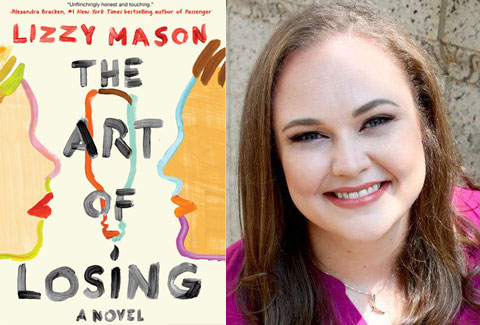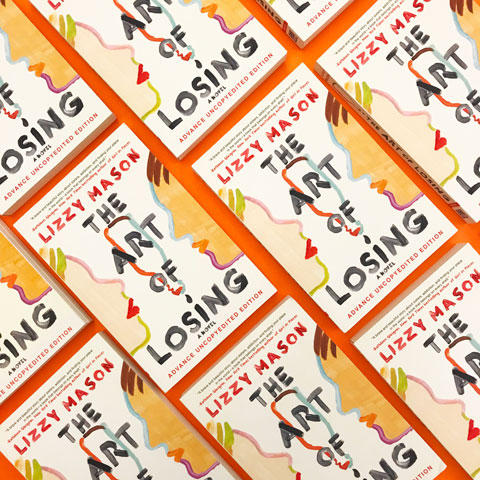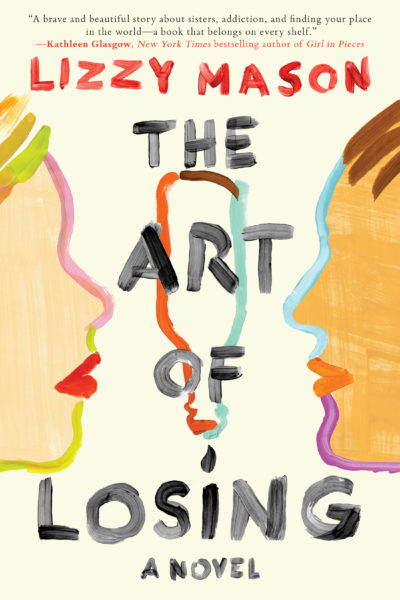
Get ready readers, Lizzy Mason’s The Art of Losing publishes this winter and it’s shaping up to be one of the most buzzed about YA debuts of 2019.
Listen to Lizzy read the first chapter here and read along below!

“A riveting story about loss, addiction, and love.” —Bustle
“Lyrical and moving.” —Jeff Zentner, Morris Award-winning author of The Serpent King
“A book that belongs on every shelf.” —Kathleen Glasgow, New York Times bestselling author of Girl in Pieces
“Unflinchingly honest and touching . . . I will never forget Harley or her story.” —Alexandra Bracken, #1 New York Times bestselling author of Passenger
Chapter One
The atmosphere in the hospital waiting room felt as thick as the summer night outside. My parents’ silent questions and accusations competed for space in the air with tension and worry.
Why didn’t I drive Audrey home from the party we went to? Who was driving the car that she was in? Why didn’t I make sure she had a way home? How could I let this happen?
Guilt warred with anger until an anxious, bitter stew simmered in my stomach. Audrey shouldn’t get to be the victim when I was the one who’d been betrayed.
I hadn’t even wanted to go to the party. If my best friend hadn’t been hosting, if my boyfriend hadn’t wanted to go, I wouldn’t have been there . . . and I wouldn’t have brought Audrey. And maybe what happened would have stayed an unspoken fear buried in my subconscious.
The vinyl chair squeaked beneath me as I shifted restlessly. Dad’s shoes scuffed the linoleum as he paced. Mom cleared her throat and sniffed. We were a symphony of anxiety.
Most parents are left waiting and wondering alone while their child is in surgery, but because Dad was an orthopedic surgeon at the hospital, every few minutes someone would come in and tell us how sorry they were. But no one could tell us what was going on. Or maybe no one wanted to be the bearer of bad news.
I wondered if they’d start bringing us Jell-O cups, but I wouldn’t be able to eat one anyway. It would bring back the memories I’d been pushing away: of the party that night where I had left my sister, of the gelatinous shots my boyfriend had been taking, of the two of them together in my best friend’s bedroom.
Dad suddenly turned mid-stride and pushed through the swinging door. I could only assume he’d lost patience and gone to check on Audrey’s surgery. A few nurses trailed after him like sympathetic baby ducks.
I stood and traced Dad’s path across the small room. When he pushed back through the door a few minutes later, I froze.
“I finally got an update,” he said. He spoke in a monotone.
“Audrey is still in the OR. She’s got swelling in her brain and it’s pressing against her skull. They’re draining some of the fluid so they can see what kind of damage there may be. She also has a broken arm that needs to be set and a fractured sternum and cracked ribs from the seat belt, but that will heal.”
That all sounded like good news, relatively speaking. The tightness in my chest eased slightly. But then he turned to me.
“Harley, there’s something I have to tell you,” he said softly, putting both hands on my shoulders in a classic I’ve-got-bad-news stance. Or maybe he was trying to restrain me in case I tried to run.
“Mike was driving Audrey home tonight. The police said he was drunk, well over the limit.”
My knees wobbled. I dropped back into the chair.
“He ran a red light,” Dad continued, “and another car hit the passenger side where Audrey was sitting.” He squatted down to look me in the eye for this last part. He was too preoccupied to remember that he had no cartilage in one of his knees from a college baseball injury. I heard it crack as he went down.
“Is Mike okay?” I asked. For a hateful second, I hoped that the answer would be no.
Dad nodded. “I just checked on him. He’s in the ER, conscious but still drunk.” His voice hardened. “He has a few bruises, a possible concussion and whiplash, but he’ll be fine. He won’t even have much of a hangover after the IV fluids he’s getting.”
I glanced at Mom, who met my gaze over the magazine she held in one hand, a ballpoint BIC in the other. She was doing the crossword puzzle in pen. And it wasn’t even an easy, celebrity-centric People crossword.
Mom loved a good puzzle. She was always so satisfied when numbers added up, whether in a spreadsheet or sudoku. You could see the joy on her face when she filled in the last letter of a crossword or snapped the last piece of a jigsaw puzzle into its place. Puzzling was where she found peace, she said.
It was half of the reason she loved her job as an accountant so much. Her main clients were a handful of local businesses—boutique stores, mostly, which was perfect for her. She did the books from home, but she got serious discounts in the stores. She had this amazing talent where she could take one expensive piece from a boutique, add some cheap basics and accessories from T.J. Maxx, and end up looking like she should be in a glossy magazine spread about chic suburban moms.
Even now, with minutes to get dressed in the middle of the night, her long-sleeved striped cotton shirt and pressed khakis would look completely appropriate if she was posed on the deck of a sailboat. Not in the waiting room of a hospital while her youngest daughter fought for her life.
But her face was white with rage, her lips a tight, pale line across her face. For the first time I could remember, it was a reflection of mine. Mike had called my phone that night just as the police called the landline. I ignored it because I thought he was calling to apologize—and I didn’t want to hear it—but also because just after my phone went silent, Dad tore into my room and told me to get in the car. Now I had to wonder what Mike would have said if I’d answered.
I turned back to Dad. “So Audrey is in surgery, possibly brain-damaged, because my boyfriend drove drunk and nearly got her killed?” I asked him.
My hands were suddenly fists. My heart throbbed so hard that a rushing noise filled my ears. How dare Mike even think of getting into a car with my sister when he’d been drinking? Like he hadn’t done enough damage for one night? Dad nodded once, his jaw clenched.
“And he’s going to be fine?” I didn’t wait for his response.
“That asshole,” I said. My fingernails pressed into the palms of my hands. “How drunk is he right now?”
“Why?” Dad asked warily.
“Because I want to scream at him. I want to punch him in the fucking teeth,” I said. “But I want him to remember it.”
“I don’t think that’s such a good idea,” Dad said, even though he looked like he wanted to do the same. “The police are there now, talking to him about the accident.”
Even through my anger, I couldn’t suppress an innate flicker of worry. I hated Mike even more for that.
Just then, Aunt Tilly shoved through the door to the waiting room. Before she could say anything, my mom stood to meet her and collapsed into her arms, sobbing. She’d been keeping it together as much as she could up until that point, but somehow seeing her older sister gave Mom the permission to release her fear and worry and rage.
Aunt Tilly was a therapist who specialized in patients with agoraphobia, so unlike my mom, who was constantly pushing me to get out of the house and take an “active role in society,” Tilly let me be who I was: a comics-obsessed girl who rarely left the comfort of my bedroom.
I felt sorry for my twelve-year-old cousin Spencer, though. Aunt Tilly could spot a lie before it even came out of my mouth. His teen years were going to be hell. But she was handy in a crisis, especially when my mom—
and I—needed her.
It was Mom’s sobs that finally cracked my shell of anger. I choked on the words I wanted to scream but wouldn’t. Tilly reached out for me and smoothed my hair, brushing my overgrown bangs out of my eyes with one hand while rubbing Mom’s back with the other.
“Let it out, chicken,” she said.
I was gulping air like it was water and I’d just run through the desert as Aunt Tilly pulled me into the hug. Mom wrapped her arm around me. Inside the huddle, the therapist replaced the grieving aunt.
“Try to breathe,” Aunt Tilly said. Her temple pressed against mine, and her hand was a reassuring pressure on the middle of my back. “In through your nose, okay?”
I took a shuddering breath in and Mom followed. Aunt Tilly counted to four.
“Good, now out through your mouth.”
We followed orders, breathing in and out for eight seconds several more times. My tears wouldn’t stop, but my heartbeat slowed a little, and I didn’t feel like I was running anymore.
Aunt Tilly finally released us from her grip, and we sat down in a soggy, red-faced row, passing a box of tissues.
Dad had slipped out the door, but by the time he came back from wherever he had gone, we’d dried our tears. I wondered briefly if he had been waiting outside the door to avoid us—or me.
“Is the other driver okay?” I asked him.
Dad nodded. “He’s fine. He was wearing his seat belt and his airbags deployed. He’s lucky.”
I closed my eyes and took a deep breath, relieved that at least one person’s life hadn’t been destroyed by this. But as
Dad pulled me into a hug, I felt sick. I knew I didn’t deserve to be comforted by my father, who may have lost his baby daughter tonight and instead had his long arms wrapped around me.
I should have brought Audrey home with me. She’s my sister. No matter what she did, I should have watched out for her. When I opened my eyes, Aunt Tilly was looking at me.
“Harley, why don’t we go get some coffee downstairs?” she said.
I nodded, even though I knew what was coming. She wanted to know what had happened.
Aunt Tilley followed me to the elevator, but once inside, she hit the button for the ground floor instead.
“Where are we going?” I asked.
“I need a cigarette,” she said, meeting my gaze with a guilty look.
I shrugged, thinking, Me, too. Aunt Tilly had supposedly quit smoking a year ago, but I wasn’t disappointed in her failure to follow through this time. I had an only-when-drinking policy about smoking, and I hardly ever drank, but little-sister- in-peril seemed like a perfectly reasonable time to break my own smoking rule.
I followed her out of the elevator, through the chaos of the Emergency Room entrance, and across the parking lot to the farthest possible corner from the hospital so no one would glare at us. The stagnant humid air made me feel like I was breathing through a wet washcloth, but that didn’t stop me from pointing at her pack until she reluctantly handed me a cigarette.
“So what really happened tonight?” she asked. “Why was Mike driving your sister home?” She let me light it before staring me down. Aunt Tilly was never one to hold back, but she wasn’t afraid of a little silence, either.
After the first satisfying lungful of smoke, I opened my mouth to answer, but no words came. I couldn’t tell her the truth about why I’d left Audrey behind at the party. I didn’t want her feeling even one ounce of pity for me when her focus should be on Audrey.
I shrugged again instead, willing my traitorous tear ducts to stay dry. “I don’t know,” I said. “I thought her friend Neema was going to drive her.”
She narrowed her eyes. I felt my pulse speed up. She knew I was lying. But she didn’t ask me any more questions.
Instead, she changed the subject to Spencer, my cousin.
“He’s supposed to go to camp this summer,” Aunt Tilly said, “but I’m not sure how he’ll handle it. You know how he can be with kids his age. Or anyone really.”
I nodded. Spencer lacked some social skills, but he was better with statistics than most graduate-level math students.
He’d picked the winner of the World Series every year for as long as I could remember.
“If he hates it, I’ll just figure something else out,” she said.
“Next year, he’ll be old enough for that math camp at George Mason.”
“Aunt Tilly, do you think my parents hate me?” I interrupted.
I couldn’t think about Spencer’s math camp when I was spiraling through a tornado of guilt. Maybe she’d known that I’d cave out of boredom and start talking to her.
“Oh, chicken.” She reached out to tuck my shoulder under her arm. “They don’t blame you for this.”
“Maybe not yet,” I said darkly. But they would.
Once we were back in the chilly air of the hospital, I steered Aunt Tilly toward the cafeteria. I really did want coffee, but I knew Dad needed a cup, too. He was used to late nights, but there’s a big difference between doing surgery at 2 a.m. and waiting for your child to come out of it.
When we walked back into the waiting room, Mom gave Aunt Tilly a withering look. She sighed a soft “Mathilda” and shook her head. No doubt she could smell the smoke on us. But for once, I didn’t care. I hadn’t even bothered with gum. “Has anyone come in to tell you what’s going on?” I asked Dad as I handed him the cup of coffee. The chair sighed as I sat, as if unhappy about my return.
“No,” he said. I tried not to read too much from the bags under his eyes. I didn’t ask if he’d gone to check on Mike again. I preferred to pretend he no longer existed.
After what felt like days, a doctor I recognized—I think he’d been to our house for dinner—opened the door and motioned for my parents to step out into the hallway. I couldn’t read his expression, but he wasn’t beaming with joy.
I could just see the side of Dad’s face through the glass as the doctor spoke, but Dad betrayed nothing. I clamped a hand over my mouth and gripped my necklace with the other. The pendant was a silver H that Audrey had given me for Christmas the year before. The sharp edges cut into my fingers and reminded me of the pain she was feeling.
When Dad opened the door, Aunt Tilly and I were already standing.
“She’s resting comfortably,” he said. “They set her arm—the humerus needed a few pins—and they repaired her fractured sternum. Her ribs will just take time. And they were able to relieve some of the intracranial pressure by inserting a shunt to drain some of the fluid from the swelling around her brain.” He took a deep breath. “That’s good news.”
“Is there bad news?” Aunt Tilly asked cautiously.
Dad shook his head. “Even though she has a traumatic brain injury, there was no bleeding.”
He sounded positive, but I could hear the strain and uncertainty.
I’d watched enough TV to know that brain injuries are bad news. And he didn’t make a “humerus” pun. He was too stressed even for that.
“So what now?” I asked.
He avoided looking at any of us. Even Mom, who’d followed him through the door and taken Tilly’s hand. She was squeezing so tightly, her knuckles were white with the effort.
“Now they keep an eye on her and wait for her to wake up.”
Aunt Tilly put her hand over her heart and whispered, “When will that be?”
“They’ve given her steroids to try to reduce the swelling in her brain, but Dr. Martinez said she needs to be put into a medically induced coma so that she can heal—” Dad’s composure fractured, and he let out a choked cry. Tears filled his eyes. Mine filled in response. “So I don’t know,” he said softly. “It could be days . . . or weeks . . .”
Or not at all, I finished in my head.
***
Buy from Your Local Bookstore | Buy from Barnes & Noble | Buy from Amazon | Buy from Soho Press
